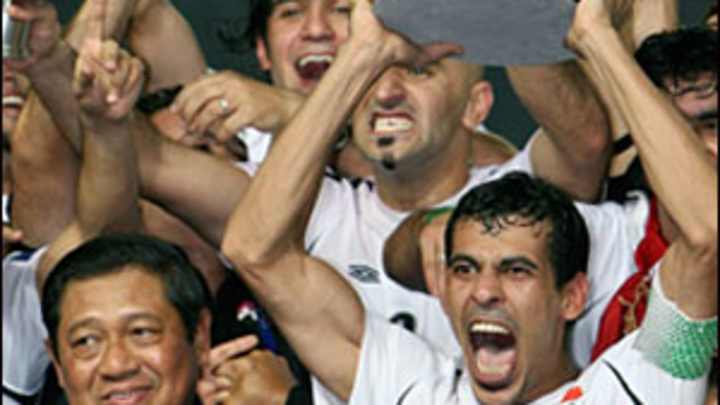My Sportsman: Iraqi soccer team

Iraq won. Note the sentence structure. Iraq (subject) won (verb), and here comes the most important part --the period. End of sentence. Now think about it for a minute: When was the last time you saw "Iraq" not followed by a word like war, dead, killed, violence, soldier, troops, much less followed by won?
In the 71st minute of the Asian Cup finals in July, an Iraqi Kurd named Hawar Mohammed passed to Younis Mahmoud, an Iraqi Sunni, who knocked in the game's winning (and only) goal. As Mohammed and Mahmoud embraced on an Indonesian pitch some 5,000 miles from their homeland, so too did people in the streets of Iraq, momentarily forgetting that they are fighting us and each other.
I won't pretend I can tell the difference between the beautiful game from Ron Howard's "A Beautiful Mind," nor will I feign any type of authority on the sectarian lines dividing Sunni from Shiite from Kurd. But as a sports writer, it is my duty to remember those times and those athletes who not only gave us a win, but a reason to hope. No one person or team did that better in 2007 than the Lions of Mesopotamia, Iraq's national soccer team.
The truly astounding part of this story isn't so much that Iraq won, as much as it is that they even played. Mohammed, Mahmoud and their teammates developed as athletes during Saddam Hussein's rule, a time when their predecessors on the national team were dragged barebacked over pavement and dipped, wounds exposed, in sewage. That's enough to make most of us hang up our cleats forever.
Then, as their time to represent their country came, the US toppled Hussein and sparked a war, eventually forcing them to redefine home as Jordan. They had no coach until two months before the Asian Cup and he promptly quit, citing the preservation of his sanity as his reason for resigning. When there weren't logistical challenges, there were emotional ones. Each member of the team lost a loved one in a bombing or shooting.
I'm not naïve enough to think this win would bring about lasting change: The Iraqi team overcame these obstacles; they did not abolish them. As if to underscore how temporary the joy of victory was, at least four people died from "happy fire" as fans shot bullets into the air in celebration. It seems even that winning is bloody there.
But for 90 minutes, 22 men -- Kurds, Sunnis and Shiite -- wore the same uniform, aimed for the same goal, and it worked. It actually worked. Iraq won -- and that, to me, deserves an exclamation point at the end of that sentence.
Agree with this selection? Give us your pick for Sportsman here.
